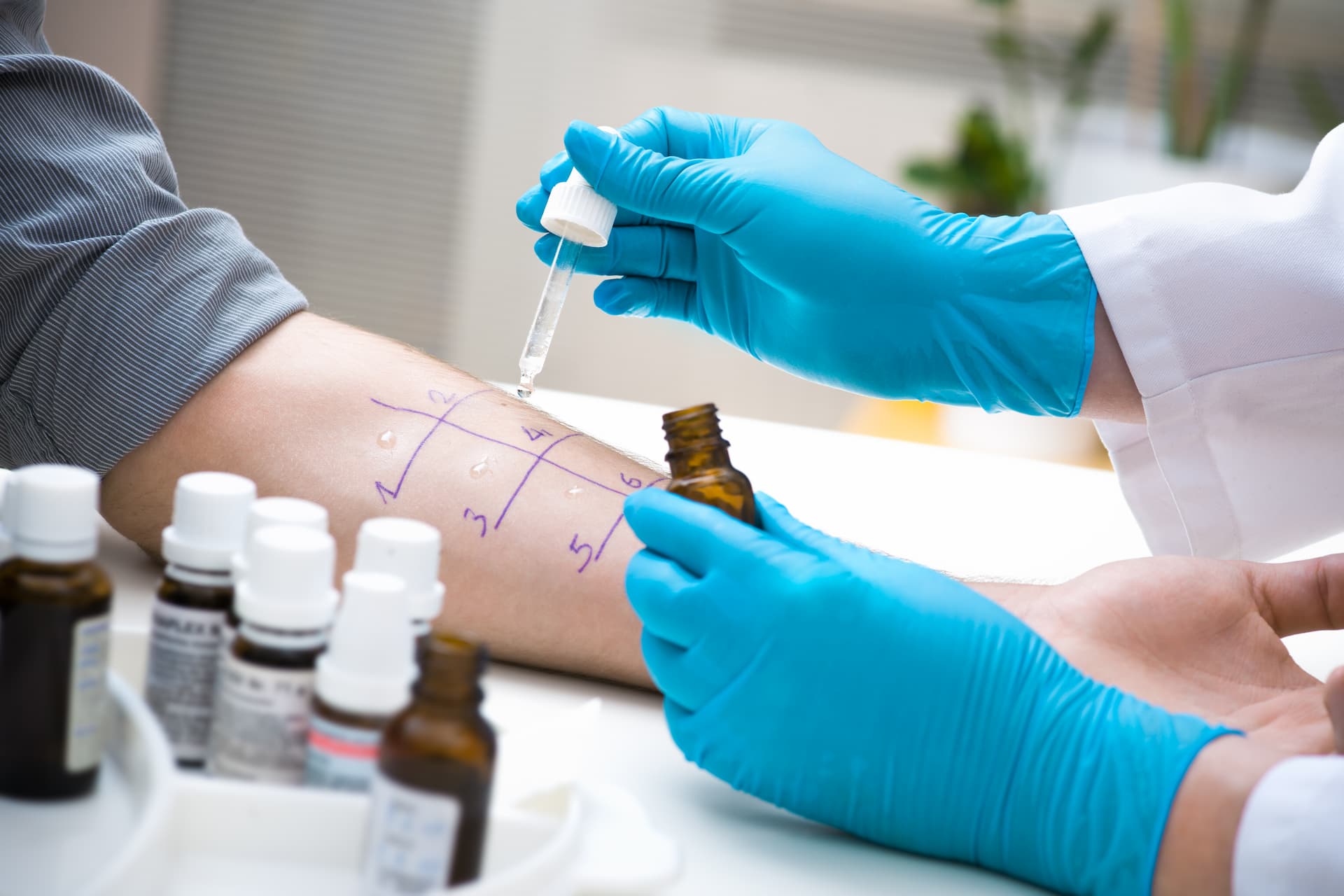Allergy Skin Test
How can you be sure if allergies and which “allergens” are responsible for your symptoms? Allergy tests, combined with medical history and physical examination, can give precise and reliable information about what you are, and what you are not, allergic to. Many people with untreated allergy symptoms do not realize how much better they will feel once their symptoms are properly diagnosed and treated by a board- certified allergist.
Skin testing is the most reliable form of allergy testing
Results of skin testing have proven to be more accurate than blood testing in diagnosing allergies. This is a safe, minimally invasive, easily interpreted, simple in-office procedure where a very small amount of a specific allergen or allergens selected by the allergist based on your medical history (such as pollen, dust mite, animal dander, mold, and/or foods) is introduced. The allergen is introduced through an indention or “prick” on the surface of the skin.
Allergy skin tests are not painful. This type of testing uses plastic devices that barely penetrate the skin’s surface.
Following the skin prick test on the back/forearm, some patients may also receive intradermal testing, where a small amount of the allergen is injected under the skin of the arm to see if it causes a reaction.
The results are available within minutes allowing your allergist to develop a personalized treatment plan immediately.

When is Allergy Testing Appropriate?
Symptoms which usually prompt a board-certified allergist to perform testing include:
- Respiratory: itchy eyes, nose or throat; nasal congestion, runny nose, watery eyes, chest congestion, cough or wheezing
- Skin: itchiness or eczema
- Abdominal: vomiting or cramping and diarrhea consistently after eating certain foods
- Severe reactions to insect stings
- Anaphylaxis/ life threatening reaction
Conditions where allergy skin test are useful include (but not all):
It is very important that allergy skin testing is directed by a board-certified allergist with specialized training, knowledge and experience, and it should be prompted by your medical history.
Medications to Avoid Prior to Skin Testing
Patients scheduled for allergy skin testing must stop taking any medications that contain antihistamines as they will affect the results of your test. This includes both over-the-counter as well as prescription medications. Do not discontinue antidepressants/psychotropic medications or any other medications without consulting with your prescribing physician. Call your pharmacy or prescribing physician if you are unsure about the names of your medications.
In general, we ask that you try to avoid these medications for 7 days prior to your appointment. If you are very sick and can’t avoid these medications, you should keep your appointment anyway – we may be able to replace your medications with ones that don’t affect the skin testing results.
As a rule, asthma medications do NOT affect skin testing results (e.g. singular, inhalers) and should be continued. Also, single-ingredient decongestant preparations (e.g. Sudafed, phenylephrine, pseudoephedrine) can be taken. All Nasal sprays can be used except Azelastine, Astelin, Astepro, Dymista, and Patanase. If there are any questions about a certain medication, please speak to your pharmacist or our nursing staff.
Stop 5-7 Days before testing:
- LORATADINE (CLARITIN, ALAVERT)
- FEXOFENADINE (ALLEGRA)
- CETIRIZINE (ZYRTEC, ALLER-TEC)
- LEVOCETIRIZINE (XYZAL)
- CHLORPHENIRAMINE (CHLOR-TAB, ALLER-CHLOR)
- PROMETHAZINE (PHENERGAN)
- TRIPOLIDINE (ACTIFED)
Medications such as over the counter sleeping medications:
- NYQUIL
- UNISOM
- TYLENOL PM
Cold medications may contain antihistamines such as:
- DIMETAPP
- ROBITUSSIN
- HISTUSSIN HC
Make sure to check for labeling for the above drug names.
Stop 1-2 Days before testing:
- DIPHENHYDRAMINE (BENADRYL)
Stop 14 Days before testing:
- HYDROXIZINE (ATARAX, VISTARIL)
- CYPROGEPTADINE
If you are taking one of these medications, please talk to the medical provider first to discuss testing options. Don't stop these medications if you don't think it would be good for your health.
- DOXEPIN
- AMITRIPTYLINE (HYDROCHLORIDE)
- IMIPRAMINE
- MIRTAZAPINE (REMERON)
- MECLIZINE (DRAMAMINE)
PRESCRIPTION DRUGS WITH ANTIHISTAMINES
- XYZAL (LEVOCETIRIZINE)
- CLARINEX (DESLORATIDINE)
- ATARAX (HYDROXYZINE)
- TANAFED DMX
- TUSSIONEX
- PALGIC
- TUSSI-12 DS (PYRILAMINE)
- BROMFED (BROMPHENIRAMINE)
- RONDEC SYRUP
- PROMETHAZINE WITH CODEINE
- NALDECON
- DURATUSS AC
- SEMPREX D (ACRIVASTINE)
- ALLERX (CHLORPHENIRAMINE)
- RYNATAN (CHLORPHENIRAMINE)
- PBZ (TRIPELENNAMINE)
- PHENERGAN (PROMETHAZINE)
- TAVIST
- PERIACTIN (CYPROHEPTADINE)
- VISTARIL
PRESCRIPTION ANTIHISTAMINE NASAL SPRAYS should be stopped 3 days before the skin test. All other nasal spray (eg. Fluticasone, Flonase, Nasonex, Nasacort) can be continued.
- AZELASTINE (ASTELIN, ASTEPRO)
- DYMISTA
- OLOPATADINE
MEDICATIONS THAT DO NOT AFFECT TESTING:
- Antihistamine Eye Drops
- Nasal corticosteroids such as Flonase, Rhinocort, and Nasocort
- Nasal decongestants such as Afrin, Oxymetozaline, and Phenylephrine
- Prednisone, Methylprednisolone, Dexamethasone
- Singular (montelukast)
- Sudafed (psuedophedrine)

